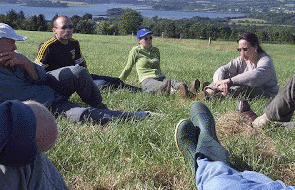

Calving is well underway and mating is looming up.
Add in all the other variables that you cannot control such as weather and the differing issues that can result from that and then someone says "maintain the communication on farm" and you feel just how is that done?
How do you find the time?
Yet you know from experience that the line re maintaining communication is totally correct. But with calving, impending mating, banks, weather, fixing gear that is needed tomorrow, when is the time to sit down and talk going to happen??
Well firstly the best way was to start with regular weekly meetings right from week one, start out with the right habits before it gets busy and they are easier to maintain.
However if that hasn’t happened, the next best plan is to start them now.
It is best if you take the view that a half hour over a coffee talking with staff about what needs to be done and how things are more than makes up for itself once back on farm and staff know what is expected, have had a chance to get questions answered and are therefore feeling more able to get things done and be adaptable themselves to the daily tasks on farm.
It sounds simple. The reality it is.
Yes there is a lot to be done, but notwithstanding an emergency that needs attention right now, then you and your staff do need to have a break.
A chance to recharge with a cuppa and a snack and allow yourself to be able to get back on farm and get through the days’ work – no one can work all day without a break and really be effective.
Just turn one of these breaks a week into a coffee meeting where you can talk farm and help each other know what is happening, what is expected and what urgent things need attention first and then what follows those in the job order around the daily tasks that simply have to happen.
Have a note book and keep track of these meetings as you will find they help with everyone knowing what to do and being more able on farm.
Staff with this support and knowledge are usually then able to get more done and the experience from most rural employers I talk with after doing this for a while is not a question of “How do you find the time?” it is usually more a question of “How could you not find the time?”
Remember most staff actually want to do a good job – and to feel they are doing a good job.
This is quite awkward to achieve when they do not really know what is happening and do not get a chance to talk things over with the boss and know what is expected and what is coming up.
One catch up a week over a coffee break you both need to have – could be the difference between the usual flat out of this time on farm and pressure of all that and staff issues.
----------------------------------------------------------
John Brosnan is a business development advider at CooperAitken Ltd, accountants in Morrinsville and Matamata. You can contact him here
We welcome your comments below. If you are not already registered, please register to comment
Remember we welcome robust, respectful and insightful debate. We don't welcome abusive or defamatory comments and will de-register those repeatedly making such comments. Our current comment policy is here.